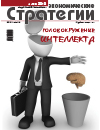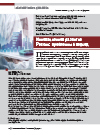Innovation Development of Russia: Problem-Based Approach
DOI: 10.33917/es-5.163.2019.90-99
Innovative development is a strategy for creating a new technological and social structure. The implementation of this agenda requires the solution of a complex of problems created by the phenomenon of innovation. The article identifies seven problem areas that impede the formation of a sustainable innovation system in modern Russia. The problem of definitions is associated with a lack of understanding of the deep essence of the innovation culture, which gives rise to a superficial understanding of innovation only as a commercialized innovation, and not as a way of life. The problem of operationalization and evaluation of innovations is associated with the dominance of technocratic and statistical approaches, which leads to linear conclusions and forms a biased picture of the development potential of Russia. The problem of spontaneity of innovation and the focus solely on the investment aspects of innovation policy can turn into significant financial losses and a decrease in the creative potential of people involved in certain branches of science and economics. The problem of the subject forms the wrong idea of innovation as an exclusive product of individual creativity, while they are the result of complex social interaction. The problem of the institutional environment is associated not so much with incubators, venture funds, technology parks and research laboratories, as with the indispensable role of the school and basic science. Last but not least, are the problems of the socio-cultural environment of innovations and their unpredictable consequences. The efficiency and sustainability of the innovation system is directly dependent on the prevailing attitude in society towards unsuccessful attempts to introduce innovations. Negative perception can generate apathy towards innovation at best, and aggression at worst. A calm assessment of failures can be the key to success. The solution of the identified problems – the constraining factors of innovation – is possible with the unidirectional energy of political, economic and research subjects
References:
|
1. Latukhina K. Sila nauki [Power of Science]. Rossiiskaya gazeta, 2014, December, 8, available at: https://rg.ru/2014/12/09/putin.html. 2. Khotyasheva O.M. Innovatsionnyi menedzhment [Innovation Management]. Saint Petersburg, Piter, 2006, pp. 13. 3. Shumpeter I. Teoriya ekonomicheskogo razvitiya [Theory of Economic Growth]. Moscow, Direktmedia Pablishing, 2008, pp. 169–170. 4. Ponomareva E.G., Nikiforova A.E. Innovatsiya kak nauchnaya i politicheskaya problema [Innovation as a Scientific and Political Problem]. Svobodnaya mysl’, 2011, no 1, p. 43. 5. The Global Innovation Index 2018. Energizing the World with Innovation, p. 313, available at: http://www.wipo.int/edocs/pubdocs/en/wipo_pub_gii_2018.pdf. 6. Uroven’ innovatsii v Rossii rukhnul do minimuma za 17 let [The Level of Innovation in Russia Collapsed to a Minimum in 17 Years]. Ekho Rossii, 2017, November, 15, available at: https://www.ehorussia.com/new/node/15168. 7. Rossiya v tsifrakh – 2018 [Russia in Numbers 2018: Statistical Summary]. Moscow, Rosstat, 2018, pp. 138, 140, 141, 147, 159. 8. Burrage M. 5 things that motivate your employees better than money. 2016, April, 26, available at: https://social.hays.com/2016/04/26/5-things-thatmotivate-your-employees-more-than-money/ 9. Piekema C. Does Money Really Motivate People? BBC Future. 2014, November, 18, available at: http://www.bbc.com/future/story/20120509-is-it-all-about-the-money. 10. Zasedanie Soveta po nauke i obrazovaniyu [Official Website of the President of Russia]. Ofitsial’nyi sait Prezidenta RF, 2018, November, 27, available at: http://www.kremlin.ru/events/president/news/59203. 11. Katasonov V. Investitsionnaya okkupatsiya Rossii [Investment Occupation of Russia]. Kontseptual, 2017, July, 24, available at: http://kontseptual.rf/investitsionnaya-okkupatsiya-rossii-valentin-katasonov. 12. Perkins J. Confessions of an Economic Hit Man. San Francisco, CA. Berrett-Koehler, 2004, 277 p. 13. Indikatory nauki – 2018 [Indicators of Science: 2018]. Statistich. sb. Moscow, NIU VShE, 2018, pp. 317, 318. 14. Taleb N.N. Chernyi lebed’. Pod znakom nepredskazuemosti [The Black Swan. Under the Flag of Unpredictability]. Moscow, KoLibri, 2009, p. 462. 15. Agarkov S.A., Kuznetsova E.S., Gryaznova M.O. Innovatsionnyi menedzhment i gosudarstvennaya innovatsionnaya politika [Innovation Management and National Innovation Policy]. Moscow, Akademiya Estestvoznaniya, 2011, 143 p. 16. Yaroslavskii plan 10–15–20. “Dorozhnaya karta” stroitel’stva innovatsionnoi ekonomiki: luchshaya mezhdunarodnaya praktika i uroki dlya Rossii [Yaroslavl Roadmap 10-15-20. International Experience and the Path Forward for Russian Innovation Policy]. N.Y., N’yu-Iorkskaya akademiya nauk, 2010, p. 36. 17. Sergeev V.M. Innovatsii kak politicheskaya problema [Innovations as a Political Problem]. Politiya, 2008, no 1, pp. 122–124. 18. Miroporyadok-2018: Fil’m Vladimira Solov’eva o Vladimire Putine [World Order 2018. Film by V. Solovyov] // YouTube, 2018, March, 7, available at: https://www.youtube.com/watch?v=uCWzU8lWCSs. |



